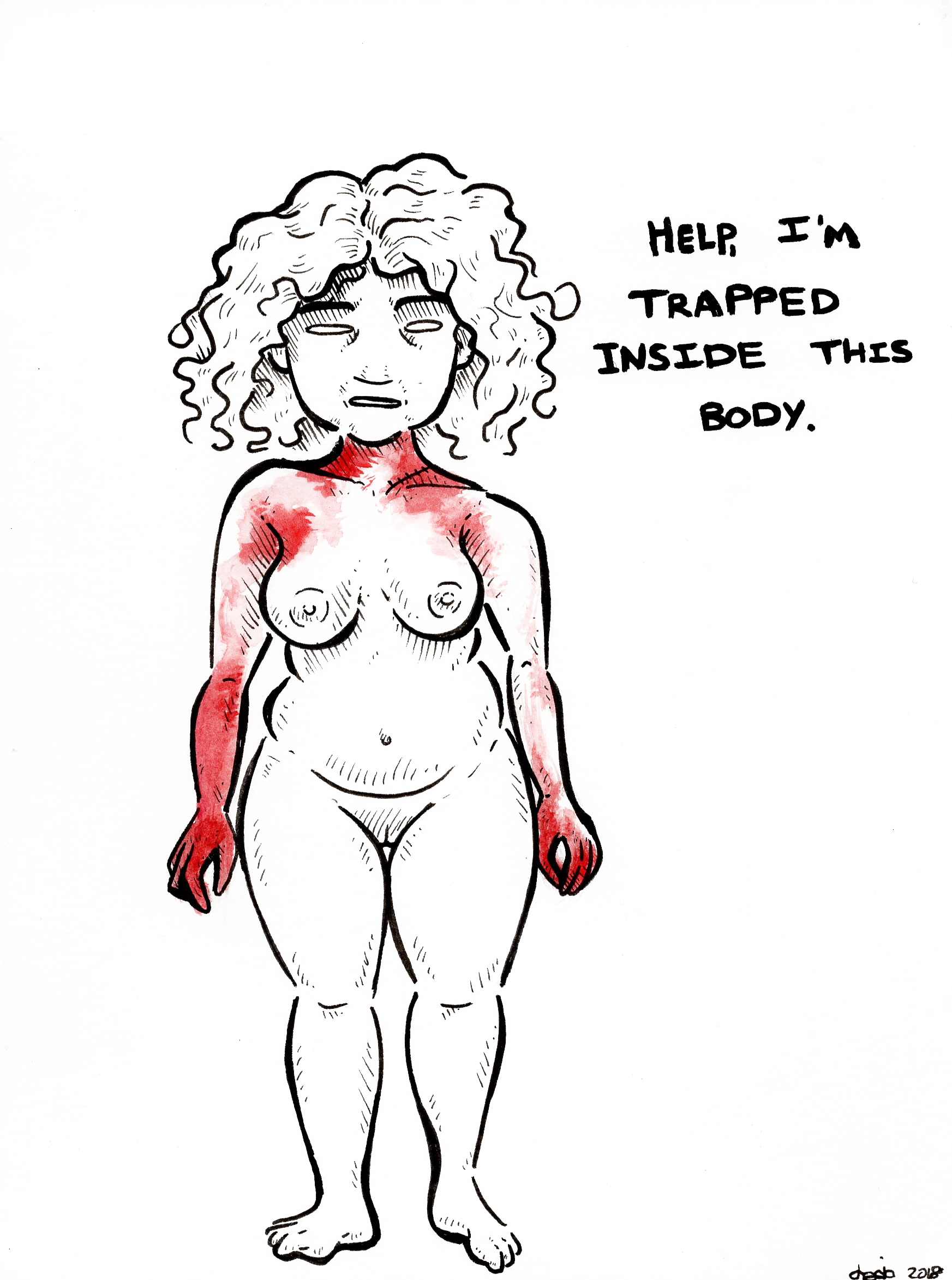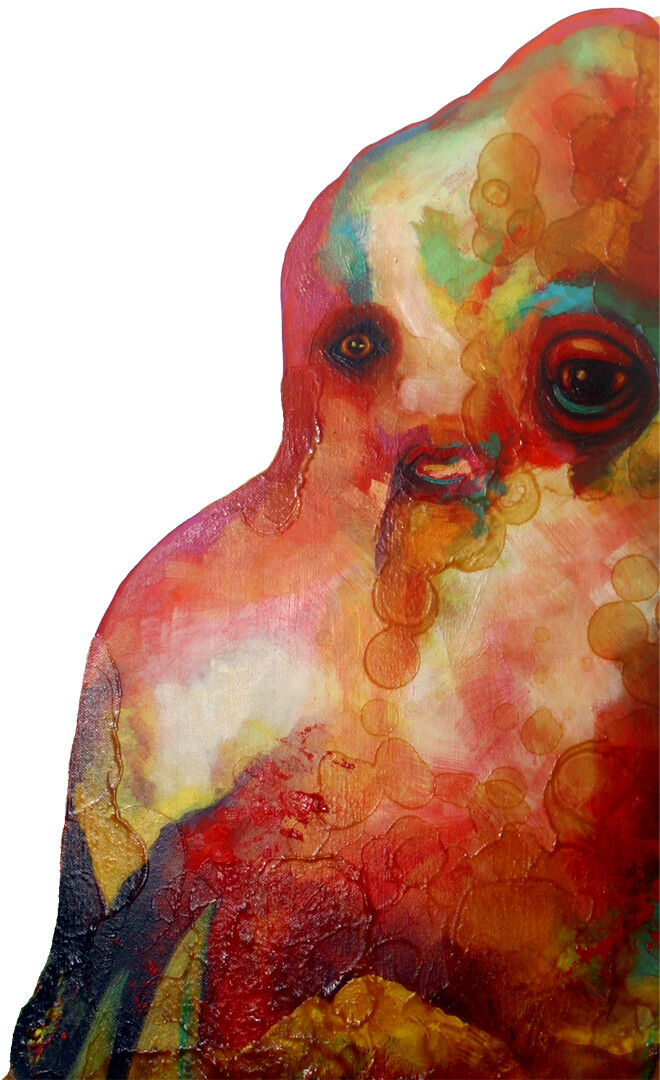
“I just don’t want people to think of you as that cripple girl.”
A lover said to me as we lay in bed together, he was questioning why I regularly wrote on social media about my experiences with my thoracic outlet syndrome. Later in our relationship, he begun to accuse me of whingeing and playing victim when I expressed my anxieties about money, he was angry at me because I had achieved some big things with creative projects which to him proved that I was therefore capable of working, if only I was creative enough to come up with a solution, if only I stopped whining, if only I stopped acting helpless and started living in the real world like he did.
“You are just a piece of shit to me right now” he said and because he’d also been calling me the love of his life, I sat and I listened. At the time, his words hurt like hell because I thought he was right. I thought perhaps that I had earned the disgust burning in his eyes and I even felt a sick sort of gratitude towards him for “just saying what everyone is thinking” because secretly, I did believe that people must look at me and think that I am just weak-willed, attention seeking and whiny. I challenged myself to speak openly about my experiences with my disability in order to combat those fears and to decrease the isolation a person can feel when they experience chronic health issues but it didn’t mean I wasn’t afraid of being secretly judged. I was, in fact, really afraid and often still am. After all, I had had that exact experience in my childhood when I was chronically ill and my classmates would tell me that their parents said I was faking it. I’ve had doctors tell me there is nothing wrong with me. I’ve had a lot of people’s responses to my health problems make me wonder if I’m crazy.
Several months after I left that lover, realising that his behaviour was emotionally abusive while still struggling with the fact that part of me still believed his words, I got surgery on my right side. I had two scalene muscles in my neck cut and my top rib removed. The two surgeons who performed this procedure on me said it was the worst case they had seen. When I was told this in the hospital, I broke down in tears, along with my mother and husband who both held me and cried with me. After so many years without diagnosis, so many years of having an invisible disability, to have a specialist in my field tell me I was a worst case he had seen was actually incredibly validating and I will always have the scar to prove the reality of my experience to myself and to others.
The improvement was almost instantaneous and for several months after surgery, I was able to progress with my physiotherapy and was even able to start painting more and more. However, for the last month, my right shoulder has dropped and have been unable to do anything. This has been really scary and disheartening but tomorrow I see my physiotherapist, who has been away, and on Monday I see my surgeon so hopefully they can offer some answers and help me get back on track because I’m scheduled to be operated on my left side on April 10 and this has made me a little anxious about whether I’m making the right choice. I’m actually still reasonably sure I am because on my left side I have some signs of arterial compression which can be quite dangerous.
Despite the emotional turmoil of the last month, I have been struck by how resilient my mental health has been through this experience, compared to last year when I was suicidal and despairing. A few things have changed since last year; I started reaching out to people more for help when I am too sore to get things done myself, I’ve been meditating a lot, I’ve been reading lots on self-compassion and focusing on not shaming myself for doing what I need to be happy. The biggest part of that ability comes from one simple realisation:
I am that cripple girl.
My disability affects every aspect of my life, every decision, every night, every day. Though disability is not visible on the outside, though my face does not crinkle in pain with every movement I make, it is omnipresent in ways that someone who is able-bodied could simply never truly comprehend without living in the reality that is my body.
Over the last three weeks, I hadn’t been posting about how bad things were because I was afraid people would see me as whingeing. I had been so positive, so excited, so productive until just recently and I was afraid that people would be disappointed with me, exasperated with me for not just getting better after surgery. But for many disabled people, there simply aren’t easy answers because bodies are more complicated than we currently understand. Over the last month, I hadn’t been reaching out to my friends and family and talking about how I was scared, scared of how the surgery seemed to be causing new problems for me, scared about going under the knife again in April, sad and unhappy because I haven’t been able to do most anything while I’ve been having these problems.
But then I realised I had to call my friends, I had to start writing again, I had to start talking about my experiences because this is the reality of my disability. Because there are no straightforward answers. Because this is hard and I need support through it. Because this isn’t my fault. Because this could happen to anyone. And when I reached out to people, I was met with nothing but compassion.
Because I am that cripple girl, that’s just my reality. I’m also that artist girl, that queer girl, that kinky girl, that comedian girl, that kind girl, that weird girl, that short girl.
I was talking to my therapist the other day, a new one I started seeing to figure out why it’s taken me so long to work through the hurt done to me by that ex-lover. The conclusions we’ve come to is that my ex-lover triggered deeply held fears I’ve held about myself since childhood and my adult insecurities about being disabled. My therapist said that he believes that some able-bodied people struggle to sit with the reality of disability, because they can do things and the idea of not being able to simply do those things is horrifying for them. It’s easier for them to judge you rather than to sit in compassion with your experience. He described my ex’s response as emotionally lazy, he said that being disabled is hard enough work without expelling energy on people who are not kind, that disabled people in particular need to surround themselves with people who are thoughtful and compassionate.
Compassion is not the same as pity. Pity is “you poor, sad thing”, pity is looking down at a person and thinking you could never fall as low as them. Compassion, however, is standing face to face with someone as an equal and realising how easily their struggles could be your own. Or as Buddhist nun, Pema Chödrön put it:
“Compassion is not a relationship between the healer and the wounded. It’s a relationship between equals. Only when we know our own darkness well can we be present with the darkness of others. Compassion becomes real when we recognize our shared humanity.”
― Pema Chödrön, The Places That Scare You: A Guide to Fearlessness in Difficult Times
I am that cripple girl. It’s simply a fact of my reality. It makes my life really hard in a lot of ways which I reserve the right to talk about, to emotionally struggle with and complain about. I am that cripple girl and sometimes being trapped in this body of mine is the stuff of existential horror. But that’s only one part of my life, one part of me. I am that cripple girl but if you think that makes me sad or pitiable, the only person that says anything about is you.

Thank you for this writing, darling.
I had a bit of a moment whilst reading it.
There’s so much I want to say about how this- we will talk in person.
I love you and your beautiful body, no matter how crippled it is.
All of my love ❤
…and I’m that fag, that AIDS person, that fake tranny…
Reading about the things you have struggled with over the past years brings me feelings of hope and aroha. How do you and I endure such similar kinds of emotional experiences, convey these through creative expressions and ultimately help others in the process? I’m glad to have a friend whose practice is real and invested in the important things.
Damn those people who tell us they love us while feasting on upon our deepest insecurities.
I may have met my future xxx